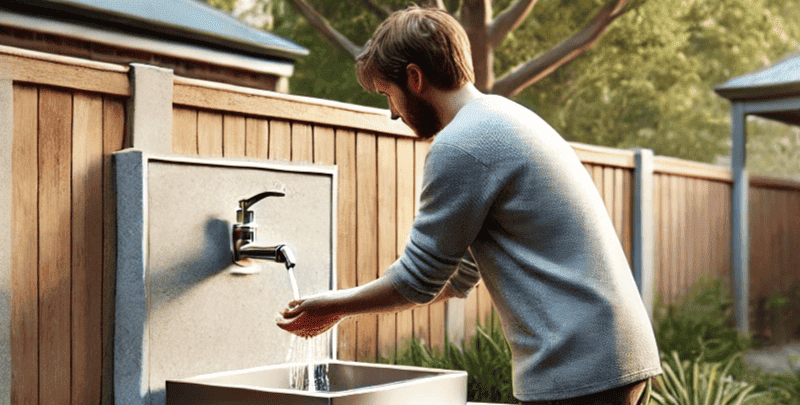Backyard Plumbing Essentials: The Outdoor Hand-Washing Station
As the weather warms up and more people spend time outdoors, having reliable backyard plumbing becomes increasingly important. A well-designed system not only keeps your yard clean but also adds value to your property.
Quality plumbing helps prevent issues like water pooling, dry grass, and clogged drains. But it can also enhance your outdoor space with useful features—like an outdoor hand-washing station. This simple addition offers both convenience and practicality, making it a great choice for any garden.
An outdoor hand-washing station allows you to clean your hands right after gardening, grilling, or playing with pets, without tracking dirt into your home. It’s especially helpful when hosting guests, as it keeps your bathroom and door handles cleaner and reduces the need for frequent cleaning.
In this guide, we’ll walk you through everything you need to know about setting up an outdoor hand-washing station—from proper drainage to choosing the right sink and faucet.
Why Install a Backyard Hand-Washing Station?
While these stations are common on construction sites, they’re becoming more popular in residential areas too. An outdoor hand-washing station is a practical, hygienic, and eco-friendly addition that improves your backyard experience. Here are some key benefits:
- Improved hygiene: Keep your home cleaner by washing your hands outside before entering.
- Convenience: Wash your hands immediately after outdoor activities—gardening, BBQ prep, or even pet playtime.
- Health benefits: Encourages good hygiene habits, reducing the spread of germs and bacteria.
- Eco-friendly: Connect to rainwater or irrigation systems to save water and support plant growth.
This small upgrade can make a big difference in how you use and enjoy your outdoor space.

Choosing the Right Location
Selecting the perfect spot for your hand-washing station is crucial for its efficiency and long-term performance. Avoid low-lying areas where water might pool, as this can lead to muddy spots and drainage problems.
It’s also wise to place the station near existing plumbing lines to reduce installation costs and complexity. Consider the type of soil in your yard—if it’s dense or clay-heavy, you may need additional drainage solutions like French drains or swales to manage runoff effectively.
Proper placement ensures your station stays functional, clean, and easy to maintain.
Essential Drainage Solutions
Good drainage is key to keeping your hand-washing station working smoothly. Without it, water can collect around the area, leading to messy conditions and potential damage. Here are some effective options:
- French drains: Help divert excess water away from your station and prevent flooding.
- Trench drains: Ideal for managing surface water and preventing pooling.
- Swale drains: Natural channels that direct water away from the area.
- Retaining walls: Help control erosion and stabilize the ground around the station.
These solutions ensure your outdoor space remains clean, safe, and functional all year round.
Building Your Outdoor Hand-Washing Station
Once you’ve set up the drainage system, it’s time to build your station. While a licensed plumber will handle the plumbing, the rest is all about style and function. Start with the basics:
- A sink basin
- Faucet and fixtures
- Drain pipes
- A sturdy frame or stand
For extra convenience, add a soap dispenser, paper towel holder, and a small counter for essentials. You can even customize it with plants, decorative elements, or child-friendly features like lower sinks or step stools.
DIY Tips for a Budget-Friendly Setup
You don’t have to spend a lot to create a great hand-washing station. Look for second-hand materials, repurpose old basins, or use reclaimed wood for a rustic look. Add hooks for towels, a few potted plants, or a splashback to make it more inviting.
With a little creativity, you can turn a simple setup into a stylish and functional part of your backyard.
Maintenance and Common Issues
To keep your station in top shape, regular maintenance is essential. Here are some tips to avoid common problems:
- Clear drains: Remove leaves and debris regularly to prevent blockages.
- Check for water pooling: Ensure no standing water accumulates around the station.
- Clean surfaces: Prevent mold and mildew by keeping the area dry and clean.
- Inspect for leaks: Check pipes and fittings periodically to catch small issues early.
With a bit of care, your outdoor hand-washing station will serve you well for years to come.
The Importance of a Licensed Plumber
Hiring a licensed plumber ensures your installation meets safety and building codes. They’ll assess your drainage needs, recommend the best solutions, and install everything properly to avoid future problems.
Professional help also saves time and money in the long run, giving you peace of mind that your system is built to last.

Environmental Benefits of Water Conservation
Designing your hand-washing station with sustainability in mind can have a positive impact on both your garden and the environment. Connecting it to a rainwater tank or irrigation system reduces water usage and supports plant life.
Proper drainage also prevents water from pooling, which can lead to weeds and mold. With smart planning, your backyard plumbing can become a green, efficient feature that enhances your outdoor space.
Your Ideal Outdoor Hand-Washing Station
Imagine coming inside after a day in the garden, hands dirty and shoes muddy. Instead of tracking it all through your house, you simply head to your outdoor hand-washing station and clean up quickly. That’s the power of a well-planned backyard plumbing solution.
Whether you're looking to improve convenience, hygiene, or sustainability, an outdoor hand-washing station is a smart investment. Make sure to plan carefully, choose the right location, and work with a professional to bring your vision to life.
Please note: This information is for general guidance only. Regulations vary by region, so always consult local authorities or a qualified professional before starting any project. See our Terms & Conditions here.
Socket-weld pipe flanges are typically used on smaller sizes of high pressure pipes. These pipe flanges are attached by inserting the pipe into the socket end and applying fillet weld around the top. This allows for a smooth bore and better flow of the fluid or gas inside of the pipe.
Socket Welding Flange,Socket Weld Pipe Flanges,Socket Weld Raised Face Flange,Socket Flange Welding
Fuyuan Marine Accessories Co., Ltd , https://www.fymarineparts.com